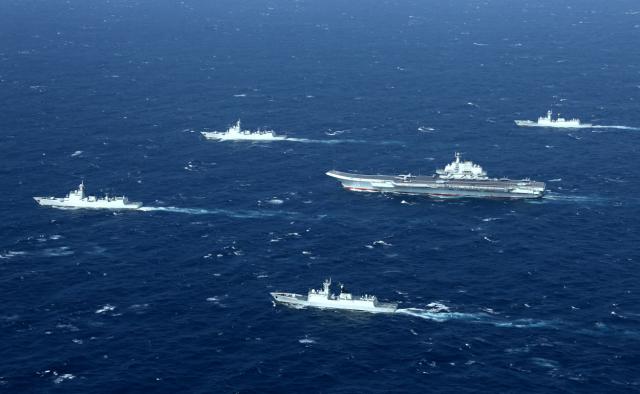Media Report

- Bloomberg reports: "Fears that U.S. President Donald Trump will start a war with China over disputed territory in the South China Sea are overblown, according to Philippine Defense Secretary Delfin Lorenzana. 'I don't think it will happen,' Lorenzana, 68, who spent more than a decade as defense attaché and war veteran's representative in Washington, said in an interview at his Camp Aguinaldo headquarters in Manila on Thursday. 'Trump is a businessman and he knows that if war breaks out, businesses will suffer.' Newly confirmed U.S. Secretary of State Rex Tillerson drew a sharp rebuke from Beijing last month when he said the U.S. would seek to prevent China from accessing facilities it built on artificial reefs in the South China Sea. Lorenzana questioned whether that was even possible, saying: 'How can you prevent something that's already there?'...'I'm not going to wage war over those small islands,' Lorenzana said. 'Even if we have the military might, we will also think twice before we engage in a shooting war,' he said...Lorenzana said it's important for the Philippines to speak up against Chinese incursions in its waters after an international tribunal ruled last year that China's claims to more than 80 percent of the South China Sea had no legal basis. The case was brought by the Philippines. 'We are not abandoning our claim in South China Sea,' Lorenzana said. 'We have two hard documents favoring us. They have nothing except their imagination.' "
- The Diplomat comments: "The new U.S. secretary of defense, retired Marine Corps Gen. James Mattis, arrived in South Korea Thursday where he recommitted Washington to deploying an advanced missile defense battery to the Korean Peninsula...It's the unit's radar, largely, that has neighbor China on edge. Beijing is worried the U.S. will use the device to spy on its military development. Washington and Seoul maintain THAAD is strictly to protect against North Korea. According to Reuters, it's widely believed in South Korea that Beijing is retaliating over THAAD by discriminating against South Korean businesses and artists. Local media have reported a big hit to the sale of Korean cosmetics in China. Fitzpatrick said China's actions 'reflect a judgement that the THAAD deployment is not irrevocable. There's nothing to be gained for China to continue to insist that THAAD not be deployed once a decision has been made. If they think the decision is not final, however, then China probably will continue to press its case,' Fitzpatrick told the Georgetown Journal of Asian Affairs."
- The New York Times reports: "Enthusiasm for the alliance in Australia...had already been under pressure from China, with which Australia conducts the most trade. Reports that Mr. Trump had scolded Prime Minister Malcolm Turnbull on Saturday, before abruptly ending the call, are likely to further undermine confidence in the United States, Australian analysts said. 'Trump is needlessly damaging the deep trust that binds one of America's closest alliances,' said Professor Rory Medcalf, head of the National Security College at the Australian National University in Canberra. 'China and those wishing to weaken the strongest alliance in the Pacific will see opportunity in this moment.'...In less than two weeks in office, Mr. Trump's actions have strained alliances and alienated potential partners of the United States...his rejection of the Trans-Pacific Partnership trade deal threatens to push countries in the Asia-Pacific region, including Australia, closer to China. Like many countries in the region, Australia depends on the United States for its security but looks to China for its economic well-being, and it does not want to choose definitively between the two as they wage a global contest for power."
Calendar
- 2017-02-02 Can Jim Mattis Fix Asia?
- 2017-02-01 China Manufacturing Activity in January Close to 2-Year High
- 2017-01-25 China Can Thrive in the Trump Era
- 2017-01-24 Trump TPP move seen as win for China, but Beijing isn’t celebrating
- 2017-01-23 China Says Prepared to Lead Global Economy if Necessary
- 2017-01-22 Chinese state media hopes for best with Trump, prepares for worst
- 2017-01-20 China’s Economy Grows Strongly, Yet Central Bank Eases Policy
- 2017-01-19 China's First Freight Train To The U.K. Rolls Into London
- 2017-01-18 U.S. Companies Are Paring China Investment Plans, Survey Says
- 2017-01-17 China’s Xi Jinping Defends Globalization at Davos
News
- Bloomberg U.S.-China War Over Sea Reefs Won't Happen, Philippines Says
- The New York Times Trump's Harsh Talk With Malcolm Turnbull of Australia Strains Another Alliance
- The Wall Street Journal Disappearance of Chinese Billionaire Alarms Financial Sector
- The Financial Times Shares slump in groups controlled by abducted China tycoon
- The Wall Street Journal Private Indicator Shows Slowdown in China's Growth
- Bloomberg No Fireworks for Chinese Stocks After Week-Long Break
- USA Today Trump loves making enemies and that's a problem
- Reuters China says no to 'currency war' after Trump criticism of yuan
- USA Today Hey Trump: Ford starts exporting Raptor pickups to China
- Reuters China raises short-term interest rates in fresh tightening sign
- The Financial Times US currency warriors take aim at the wrong target
- BBC Why is Asia demanding so much baby formula?
- The New York Times Trump's Granddaughter, 5, Sings in Chinese, and China Swoons
Commentary
- The Diplomat Mattis Pumps up THAAD, But China Likely to Keep 'Bullying' Korea
- Newsweek How Trump is Alienating Allies and Making China Great Again
- Forbes China Understands The Limits Of Financial Engineering
- The Wall Street Journal A 'Green Leap Forward' in China? What a Load of Biomass
- Bloomberg View Mexico Blowback Should Dissuade Trump From Taking On China
- Forbes The U.S. Must Help Transform China Into A Democracy
- The Guardian: Opinion Donald Trump is making China great again
